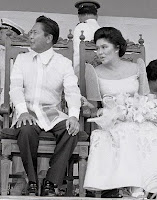Christmas rush: its evolutionary origins
 The holiday season is made out to be a time of reflective re-visiting of our personal bonds with family and friends. However, reading all these reports about the The Rush -- and the congestion it causes -- from both the Media and friends, it seems to me, that the very perspective that is encouraged in the greetings and messages we exchange is the biggest casualty of the Silly Season.
The holiday season is made out to be a time of reflective re-visiting of our personal bonds with family and friends. However, reading all these reports about the The Rush -- and the congestion it causes -- from both the Media and friends, it seems to me, that the very perspective that is encouraged in the greetings and messages we exchange is the biggest casualty of the Silly Season.What really motivates gift giving in the Christmas season? Is it really some noble altruism that supposedly resides in the depths of our "Christian" psyches that is behind this rush of benevolence? Consider what is likely a familiar conversation in the heat of The Rush:
Hey, did you get a little something for Tito Lelong and Tita Lelang? Nakakahiya naman.
There you go.
Nakakahiya.
Perhaps it is more of the fear of being seen to be not in the "spirit" of things that drives us to conform.
After all, we are social beings. Our predisposition to form and maintain strong social networks (the term used in its more fundamental sense before Friendster then Facebook came along to hijack the concept) is a million-year-old evolutionary instinct that we share with most primate species and higher mammals. The pressure to conform is a deeply-ingrained heritable (i.e. genetically-coded) property of our minds. The fear that is induced when this instinct to conform is under threat highlights how powerful this instinct is.
Fear is a strong behavioural motivator for most organisms and is associated with fundamental behaviours that most directly determine an individual's chances to survive to adulthood, mate, and reproduce. As such, the fact that fear is an emotional consequence of a failure to conform to the rituals of one's social network indicates how important conformity was in the repertoir of survival mechanisms applied by our ancestors -- an evolutionary legacy that remains a powerful behavioural driver even today.
Given this context, perhaps let us regard the rush we see around us as a biological phenomenon. That way, we make less pretenses around what the season's bustle is really all about. Only then can we make a truly insightful leap in perspective and embrace the real spirit of the season.




The real reason Christmas bugs me so much, I suppose, is the idea that being decent and good-natured to one another is somehow calendar-dependent.
ReplyDeleteKinda like Valentine's Day. Why can't couples just make all 365 days of the year a Valentine's Day instead of squeezing the whole shebang (literally) into one day? :-)
ReplyDelete